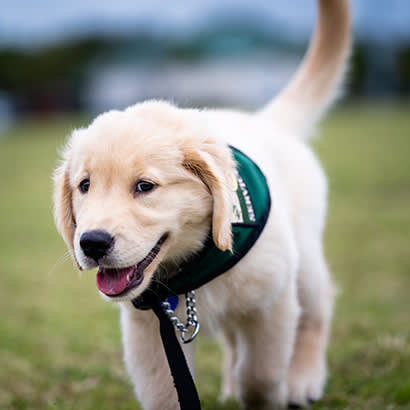
For an enhanced digital experience, read this story in the ezine.
As generations age, the use of service dogs is on the rise. As more and more visitors frequent our parks and facilities, so will service dogs. It is estimated that there are more than 500,000 service dogs in use currently in the United States, and that number is expected to rise. The Americans with Disabilities Act (ADA) and individual state statutes will determine the extent in which different types of service dogs have access to your facilities. As an industry, service dogs are often seen at senior/active adult centers, community centers, athletic/sports complexes and even playgrounds. These dogs help enhance the abilities of their handlers and provide equitable access to a service being provided to the community. Examples of different types of service dogs are seeing-eye dogs, diabetes alert dogs and mobility assistance dogs.
Understand the Types of Working Dogs
Service dogs are “task trained” dogs (of any breed) that enhance the ability of a person to participate in everyday opportunities. These are different than emotional support animals (ESA) or therapy/facility dogs. A service dog has full access and rights to all facilities, whereas an ESA has no public access, and a therapy/facility dog only has access to the facility at which it is “working.” For example, a service dog must be allowed on the pool deck with its handler, but the dog is not allowed to swim in the pool.
Know the Laws
There are no “certifications” or legal paperwork for service dogs. As service providers, the only questions one may ask their patrons visiting are: “Is that a service dog?” and “What service does it provide for you?” Employees may not ask for any medical paperwork or proof of a skill or task. A service dog is not required to have any type of vest nor identifying marks to be considered a working dog. The dog must be leashed or tethered to the handler at all times, unless it obstructs the handler. Handlers are liable for all damages if an accident occurs. The only way a facility can ask for a service dog to be removed is if the animal is not housebroken, or it is considered to be a direct threat to the health and safety of others. Allergies and fears of animals are not valid reasons to ask for a service dog to leave.
Open Conversations
Service dog organizations provide new routes to community relationships and programming. Organizations that train service dogs are constantly looking for different types of “exposures” to make sure their dogs are ready for their future handlers. A senior center serves as a great place to host these trainings. For example, bringing a dog to a knitting club not only benefits the dog’s training, but also can brighten the day of your participants who may not be capable of caring for animals anymore.
Remember the Reason
The first step to ensuring an inclusive environment for individuals who require service animals is to become familiar with the ADA guidelines, as well as your state statutes. Understand your facility, county and city codes of ordinances, making sure that you are not violating the ability for someone to enjoy recreation just as everyone else. Train your employees to be comfortable answering questions from other patrons about dogs at a facility. True service dogs are not a distraction. They are well-groomed, well-behaved and the general public is, oftentimes, unaware they are even there.
The point of a service dog is to make life more equitable for the handler and for them to be able to enjoy everyday activities and services just like everyone else. They want to enjoy the incredible programing, facilities and events that you are providing as a park and recreation professional!
New Horizons Service Dogs, Inc., is a 501C(3) in Orange City, Florida, that provides task-trained service dogs to members of the community in need.
Hannah Cooper is a Service Dog Trainer with New Horizons Service Dogs, Inc.

